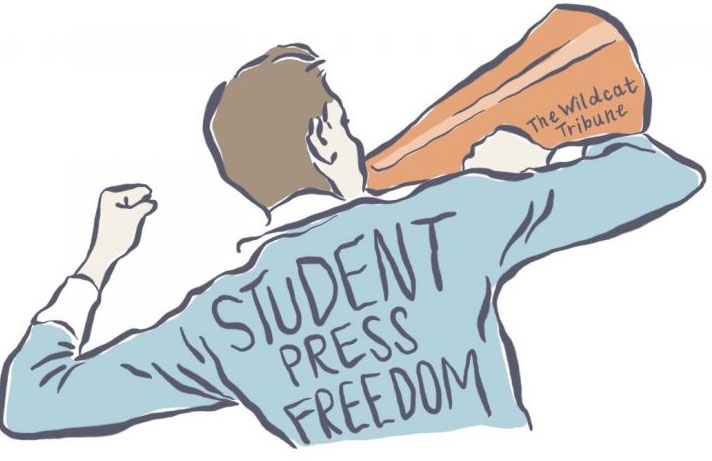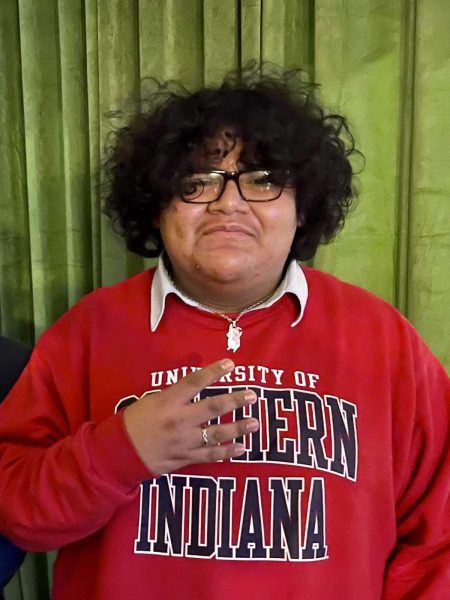Colleges around the country have dealt with censorship for a long time, especially within their student media and publications departments. Problems can arise for various reasons, such as faculty and administration objecting to published content, staff disrupting distribution, accusations of obscenity and more. Some colleges maintain a hands-off approach to student press, but interference is common depending on the type of school and its location.
In April 2019, Taylor University in Indiana surveyed Christian colleges across the United States to compare their levels of censorship to those at public institutions. Seventy-six percent of these schools reported experiencing pressure or censorship, including demands to delete, retract or edit content after publication. Schools with particular values often establish policies that prioritize those values over First Amendment rights.
Even when newspapers, outlets and magazines are considered independent, colleges and universities still attempt to control them. In some cases, state officials also weigh in.
There are several instances of such interference. Penn State removed print kiosks from campus after some contained political ads. Norwich University suspended its student newspaper for an entire semester without explanation. Haskell Indian Nations University’s president issued a directive forbidding the student paper from recording interviews and asking questions of public officials. Additionally, the university revoked the paper’s independent status and withdrew funding.
A similar situation unfolded at the University of Texas at Dallas, where the student newspaper’s editor-in-chief was removed, leading to the creation of a brand new independent student publication.
Maria Shaikh, managing editor, described how the relationship soured between school administration and The Mercury. At one point, The Mercury served as a “PR mouthpiece” for the administration, covering events and reporting on favorable topics. However, when the paper shifted to more critical coverage of administrative actions, the university began pulling back.
“We started seeing administration and different offices around campus kind of pull back from us, become a lot less communicative with us,” Shaikh said. “That was a really big issue that we were trying to overcome in terms of getting fair and balanced reporting.”
The situation escalated when The Mercury covered an Israel-Gaza war protest on May 1, 2023. Staff reported on the event, conducted in-depth research and even visited those arrested. On May 20, they published an issue covering the protest. The administration, unhappy with the coverage, removed the issues from kiosks.
Shaikh recalled a subsequent meeting with the paper’s management team.
“In the next few days, our then-adviser to The Mercury, Jonathan Stewart, is demoted and replaced by his boss, Jenni Huffenberger, who was the senior director of marketing and student affairs [now senior director for communications with student affairs]. Jenni had a meeting with our management team and told us that our protest coverage was journalistic activism and journalistic malpractice. She made it out to be this unacceptable thing that we did.”
Following those events, The Mercury was assigned a new and permanent adviser, Lydia Lum, who is no longer with the university. Over the next three months, Lum distanced herself from the paper, excluding herself from meetings and declining to review published work. Due to this disconnect, she later refused to allow Mercury staff to attend journalism conferences, stating that she “felt like she didn’t know us very well.”
On Sept. 12, editor-in-chief Gregorio Olivares Gutierrez received an email from UT Dallas’s Student Media Operating Board (SMOB). Initially believing it to be a routine start-of-the-year meeting, he soon realized it was a hearing for his removal. Lum had pushed for the meeting, accusing him of holding multiple jobs, causing budget overruns, and preventing her from performing her role effectively.
“We get just this email and it’s like, ‘The only thing in our itinerary is your removal from office.’” Olivares said. “So that takes me by surprise. I already knew the campus administrators weren’t fond of me, but I thought we had some kind of continuous agreement of like, we will cooperate where it is applicable. We’re not violating ethics.”
Shaikh and Gutierrez found the meeting unprofessional. Student members of the operating board were not allowed to attend due to privacy concerns. The meeting lasted hours, but Gutierrez was given only 10 minutes to defend himself against various accusations.
“I was presented with 10 minutes to defend myself, provide a rebuttal to the baseless claims that Lydia Lum made, and then it was just kind of like -a hectic back-and-forth where they would ask me questions and I would try to answer,” he said.
While trying to make his case, Gutierrez was repeatedly interrupted. He recalled one particular moment when Huffenberger accused him of secretly working on a housing story, which he denied.
“The most I had done was send questions over on behalf of Maria to the Office of Communications, because as editor-in-chief, that’s one of my tasks. Whenever we’re dealing with a high-up admin, I usually handle the administrative process to get those questions through.”
Following his removal, The Mercury staff went on strike, ultimately creating a new, fully independent publication, The Retrograde. The Mercury published its final stories, issued its last print, and posted a statement on its website announcing that it would cease all operations.
Instances of censorship are not isolated to UT Dallas. Just 120 miles north of Evansville, another controversy unfolded at the Indiana Daily Student (IDS) at IU Bloomington. After the 2024 elections, IDS printed an issue featuring opinion and news pieces about the results. The cover depicted president Donald Trump’s face in red and blue with quotes from former cabinet members criticizing him.
These quotes included, “A defiant 9-year-old kid,” “a danger for the United States,” “moron,” “fascist,” and “he tries to divide us.”
Co-editor-in-chief Marissa Meador explained, “We really wanted to show the historic nature of his election by having the juxtaposition between his victory—a pretty resounding victory—and what his former allies had said about him.”
Lieutenant Governor Michael Beckwith created a social media post on X, formally Twitter, about it nearly a week after publication. He called the coverage “woke propaganda” and implied that the state should intervene, stating, “This type of elitist leftist propaganda needs to stop or we will be happy to stop it for them.”
The Herald-Times, a Bloomington news outlet, reported that Beckwith had considered defunding IDS. While he lacks direct control over IU Bloomington’s budget, he could influence funding decisions through his role as lieutenant governor and tiebreaker in the Indiana Senate.
Jacob Spudich, co-editor-in-chief of the IDS, said, “I think it’s a good point in saying, you know, we’re all kind of in the same boat, even miles and miles apart in Indiana, Texas or California,”
He added, “We’re all kind of tackling the same issues, whether from different administrations and universities. I think it’s important.”
“Censorship is becoming a larger and larger problem, especially under the current Trump administration,” said Aimee Morgan, news editor for The Retrograde. “I think there’s a lot of self-censorship going on due to fears of absolutely hitting those titles under diversity, equity and inclusion, which I think is very conflicting with the real narratives that every person has within our own lives.”




